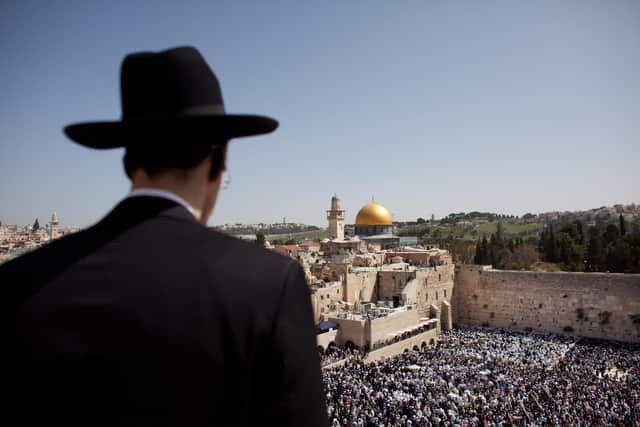Passover 2023: what is Jewish holiday, when is it, meaning, key dates, how to say ‘Happy Passover’ in Hebrew?
and live on Freeview channel 276
Passover, also known as Pesach in Biblical Hebrew, is a major joyous Jewish holiday. It is a significant festival, marking the exodus of the Israelites from slavery in Egypt, as they were guided by Moses. It represents that "passing over" of the forces of destruction or the sparing of the firstborn of the Israelite on the eve of the Exodus.
But what exactly is Passover, its significance and how is it celebrated? Here’s what you need to know.
What is Passover?
Advertisement
Hide AdAdvertisement
Hide AdThe Passover story is from the book of Exodus, about the ancient Hebrew’s enslavement in Egypt and how they were freed by Moses. Passover is also the central story of the Torah and captures the biggest themes in Jewish history: oppression, freedom, resilience, and the contrast between living inside and outside of Israel.
The history of Passover begins in Egypt, with the Pharaoh worrying that the Jewish people living in Egypt will outnumber his people and so he forces them into slavery and that sons born into Hebrew homes will be drowned in the Nile. However, Moses, after being placed in a basket and sent down the river, is saved and adopted by the Pharaoh’s daughter.
As Moses becomes an adult, he is told by God to command Pharaoh to let the Jews go, and when the Pharaoh says no, God sends the Ten plagues. The Ten plagues culminate in the death of every firstborn of every household. However, Moses told the Jews to mark the door of their house with the blood of a lamb they have sacrificed, known as the Passover offering. Since God ‘passes over’ their homes, Jews give thanks for being ‘passed over’ during this festival.
As a result of the firstborns dying, and the Pharaoh losing his son, he lets the Jews go. However, the Pharaoh changed his mind and chased the Jews as they were leaving Egypt, which led to Moses’ most famous miracle - the parting of the Red Sea. After passing the Red Sea, and spending 40 years in the desert, they came to the land of Israel.


When is Passover?
Advertisement
Hide AdAdvertisement
Hide AdPassover begins on the 15th day of the first Hebrew month, Nisan. This date typically falls in March or April of the Gregorian calendar. The 15th day begins in the evening of the 14th day, and the seder meal is eaten that evening.
As Passover is a spring festival, the 15th day of Nisan usually begins on the night of a full moon after the vernal equinox, but due to leap month, it can start on the second full moon. For this reason, the first day of Passover is on the evening of 5 April 2023, last for seven days and end at sundown on Thursday 13 April 2023.
How is Passover celebrated?
Passover is a joyous festival celebrating freedom and is celebrated for seven days inside Israel and eight outside as the Torah dictates. On the first night, a special familial meal, called the Seder is held - usually at home and not in the Synagogue.
The customs of the Seder include drinking four cups of wine, eating matza (unleavened bread) and consuming foods placed on the Passover Seder plate whilst telling the story of Passover. The order of a traditional Seder is printed on the Passover Haggadah (Jewish text) and follows:
- Kadeish (blessings and the first cup of wine)
- Urchatz (wash hands)
- Karpas (appetiser), where each participant dips a vegetable into saltwater or vinegar.
- Yachatz (breaking of the middle matza)
- Magid (relating the Exodu)
- Rohtzah (ritual washing of hands)
- Motzi (blessing over the matzah)
- Matzah, to bless the matzah
- Maror, to bless bitter herbs
- Korech, to place the bitter herbs in the two small pieces of matzo and eat
- Shulchan Orech (the meal)
- Tzafun (eating the afikoman(refreshments))
- Bareich (Grace)
- Hallel (songs of praise)
- Nirtzah (prayer)
Advertisement
Hide AdAdvertisement
Hide AdA vital component of Passover is the Passover sacrifice, where the Torah mandates the Israelites to ritually slaughter on the evening of Passover and eat on the first night of the holiday with bitter herbs and matzo. However, modern religious Jews pray or give charity to atone for their sins instead of sacrificing a lamb or a goat.
The first and seventh days are sacred, the last marking when the Jewish people of Egypt were free from being slaved. For this reason, many Jewish people opt not to work on these sacred days.
How do you say Happy Passover in Hebrew?
On Passover, Jewish people wish each other a “kosher and joyous Passover.”
In Hebrew you can say “chag Pesach kasher vesame’ach” (pronounced: CHAG PEH-sach kah-SHER ve-sah-MAY-ach). In Yiddish, it is “a koshern un freilichen Pesach” (pronounced: KUH-sher-in OON FRAY-lech-in PAY-sach).
An alternative pre-Passover wish is for “a zissen Pesach,” meaning, have a sweet Passover.
(In these transliterations, “ch” represents a sound similar to the one in “loch” or “Bach.”)
Comment Guidelines
National World encourages reader discussion on our stories. User feedback, insights and back-and-forth exchanges add a rich layer of context to reporting. Please review our Community Guidelines before commenting.
